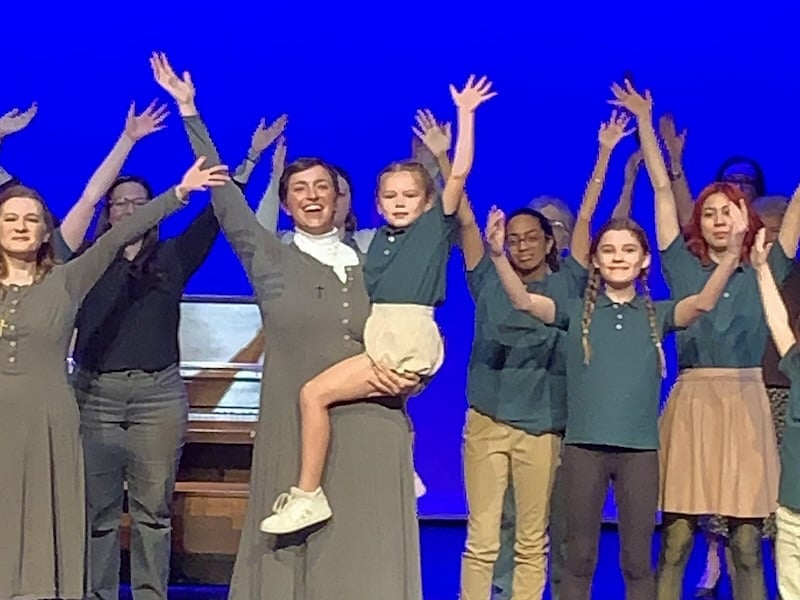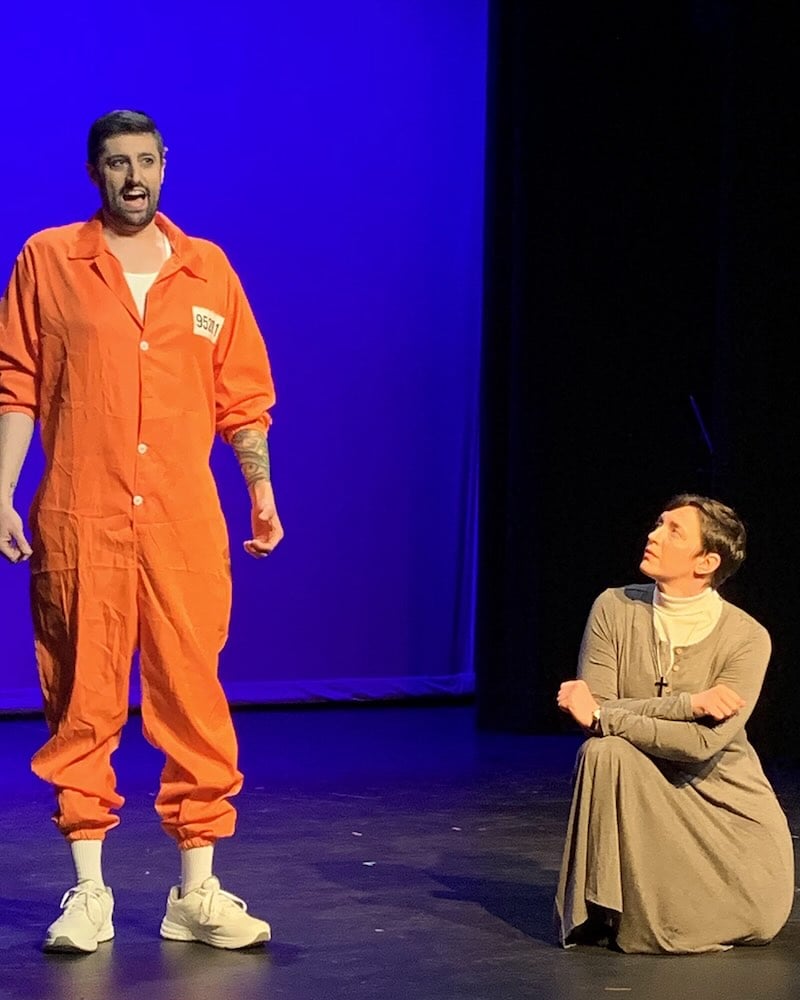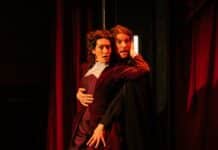Dead Man Walking presented by Opera AACC, the performing arts group at Anne Arundel Community College, is an emotionally gripping, powerful opera. Composed by Jake Heggie with a libretto by Terrence McNally, the work is based on Sister Helen Prejean’s book about her experiences with a man on death row. Stage- and music-directed by Douglas Brandt Byerly, the production dramatically raises questions about faith, forgiveness, and justice.
Mairin Srygley brings a quiet determination to Sister Helen. Even as she questions herself on the drive to see the prisoner Joe, she reminds herself she has always been “reckless,” never more so than when she became a nun. Waking from nightmares of Joe’s crime, she wonders about forgiveness but refuses to stop seeing him. She urges Joe to tell her the truth of what happened and reacts with horror at his story yet still comforts him. She strengthens herself with prayers and hymns. She captures what faith can be: not afraid to feel, to fear, to push, while bringing compassion and dashes of humor to difficult situations.

Michael Pistorio plays the condemned prisoner Joe De Rocher with a mixture of defiance and fear. On first meeting Sister Helen, he tries pushing her away by asking about virginity; when their time for the meeting is up, though, he begs her to help him before being dragged away. Given the date of his execution, he scoffs and continues working out, but later, the image of the girl he killed haunts him. His most powerful performance comes near the end, when after telling what happened, he collapses to the ground weeping. He embraces Sister Helen, who holds him.
Tamara Tucker gives wisdom to Sister Rose, a friend to Sister Helen. Trying and failing to convince Sister Helen not to take on Joe’s case, she gives profound advice about forgiveness. She kindly but quickly corrects Sister Helen’s song to the children. Will Kuethe plays Father Grenville, the prison chaplain, with annoyance. Rejected by Joe, he sees him as a lost cause, advising Sister Helen to get out, after making a weak joke about air conditioning. Jim Williams brings an authority to the Warden. He guides Sister Helen through the maze of inmates, telling her to look straight ahead. Later, he shows vulnerability in softly commenting on the 200 death row inmates under his care, “They’re all going to die.”
Mary Anne Barcellona bring a tenderness to Joe’s mother. Speaking at his hearing, she steps out from the podium to ask, “Haven’t we all suffered enough?” and to show a comb Joe bought her. Later, at their last meeting, she tells Joe not to say anything, believing in his innocence. She stays strong until he leaves, then collapses. Justin Walter and TJ Haney play Joe’s younger brothers with a youthful innocence, holding onto their mother and replying politely to Sister Helen’s questions.
Matthew Frieswyk, Rachel Sitomer, Diana Cantrelle, and Lance Fisher bring a grief to the parents of Joe’s victims. They ask Sister Helen where she was when they needed comfort, remembering the last, banal things they said to their children. Frieswyk, in particular, is angry, berating Sister Helen for her support of Joe. Later, though, he admits to doubts, knowing that his anger will not bring back his children.

Craig Beyler and Brian Farrell bring an arrogance to the prison guards, beating the inmates for their crass comments toward Sister Helen and later remarking to Joe how they could get good money for a lock of his hair. Dillon McCarrick brings a wry humor to a cop pulling over Sister Helen for speeding. He remarks, “I never pulled over a nun before.”
The AACC Chamber Singers and Concert Choir play mothers, nuns, and inmates. As inmates they are aggressive, fighting and circling around Sister Helen, asking for a kiss. The All Children’s Chorus of Annapolis play children at the nuns’ school, some playful, others sullen.
The stage is bare, with items like a piano, benches, cots, and chairs brought in as needed. The execution table, designed by Sean Urbantke, is formidable and strangely religious. In the back is a screen, on which photographs by Jim Conyers show in the beginning images of Joe’s crime. Costume Consultant Mary Bova and Costume Coordinator Tania Rose Bindhoff create simple outfits that help distinguish each character. Joe and the other inmates are in orange jumpsuits, while Sister Helen and the other nuns wear plain gray dresses. The prison guards look imposing in their outfits.
Lighting Consultant Adam Byerly and Lighting Coordinator Will Roberts enhance the emotion with lighting. Red light bathes the stage during intense moments. When Sister Helen takes a picture of the De Rocher family, light flashes and yellow light shines. Audio Designer Zach Sexton throws out sounds of a police siren as well as a woman’s scream at the beginning.
Quinton Folks conducts the Opera AACC Orchestra, bringing out the intricacy and drama of Heggie’s music. In the beginning, the music occasionally overwhelms the singing, but they usually stay in good balance. Stage and Music Director Douglas Brandt Byerly keeps the tension high throughout, balancing active movement with quiet stillness. The performers sing clearly, hitting all the right emotional moments, with even some comedy. There are lots of solos, duets, and choral work. Without taking sides, Dead Man Walking shows the complexity of the death penalty, as well as what true faith and compassion are capable of. Kudos to Opera AACC for taking on such a thought-provoking contemporary opera. Only two performances remain, so go see it!
Running Time: Approximately two hours and 30 minutes, including one 15-minute intermission.
Dead Man Walking plays Saturday, March 15, 2025, at 2 PM and Sunday, March 16, at 3 PM presented by Opera AACC, performing at the Robert E Kauffman Theater in the Pascal Center for the Performing Arts, 943-951 Anne Arundel Community College Road, Arnold, MD. For tickets ($15–$25) call the box office at 410-777-2457 or purchase online.


![Edgy, eerie ‘↓D←R←O←W←N←E←R [Renword]’ is laugh-out-loud at NextStop](https://dctheaterarts.org/wp-content/uploads/2026/02/Jasmine-Proctor-Nicole-Halmos-Amber-Patrice-Coleman-Heather-Regan-Photography.jpg-1600x1200-1-218x150.jpg)
